What Does Pepper Spray Do to an Attacker?
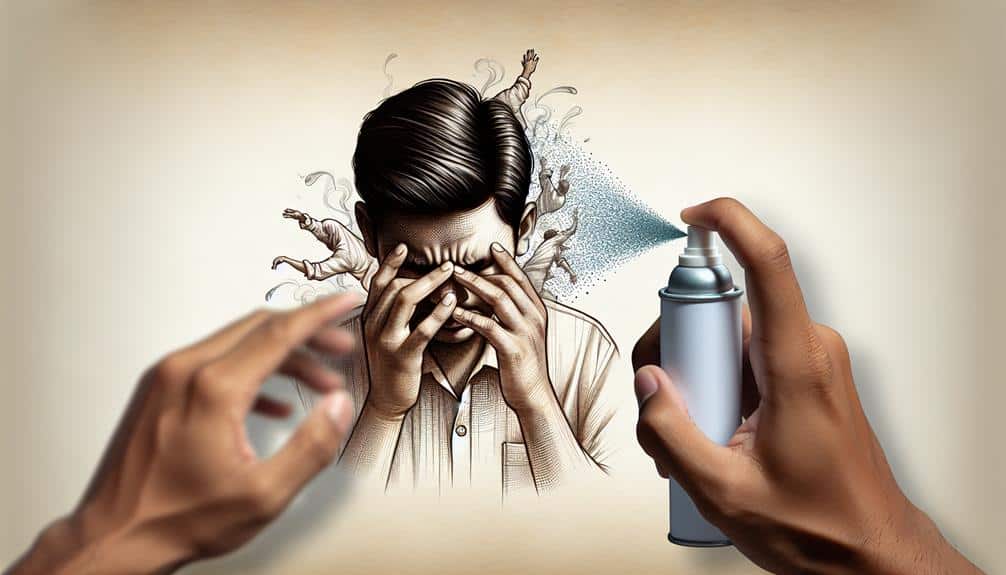
Pepper spray debilitates an attacker by causing immediate pain and disorientation. It induces intense burning in the eyes, leading to involuntary tearing and temporary blindness. Additionally, it irritates the skin, resulting in redness and swelling. Respiratory distress and difficulty breathing are also common, making it hard for the attacker to focus or continue their assault. The effects typically last between 30 minutes to an hour, giving you a crucial window to escape. Proper usage and understanding of pepper spray can enhance your personal protection strategies. Want to understand safety tips or legal considerations? There’s more to uncover.
Key Takeaways
- Causes severe burning and irritation in the eyes, skin, and respiratory system.
- Induces immediate tearing and involuntary eye closure, leading to temporary blindness.
- Triggers intense respiratory distress, making it hard to breathe.
- Creates disorientation and inability to focus due to intense pain.
- Temporarily incapacitates the attacker, providing a crucial window for self-defense or escape.
Immediate Effects on Eyes
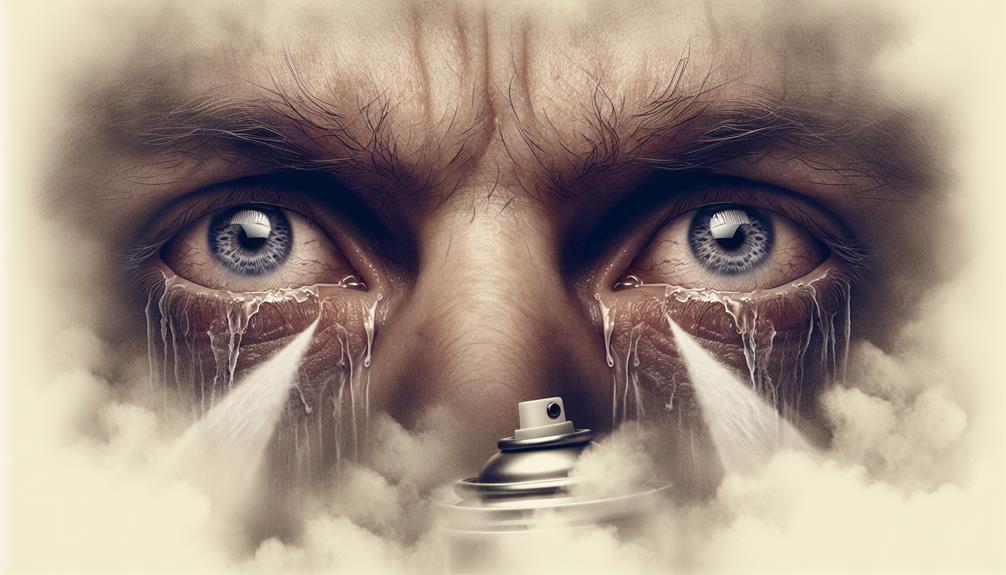
When pepper spray contacts the eyes, it causes intense burning pain and immediate tearing. The primary agent, capsaicin, binds to the ocular membranes. This interaction leads to the eyes closing involuntarily and can result in temporary blindness. You can expect severe discomfort almost instantaneously. The effects include not just tearing, but also stinging and swelling of the eyes.
Understanding these immediate effects is vital if you aim to master the use of pepper spray for self-defense. Once the spray hits the eyes, the capsaicin activates pain receptors, making it nearly impossible for the attacker to keep their eyes open. This temporary blindness significantly hampers their ability to see or act effectively.
The discomfort is amplified by the fact that the eyes’ natural response is to produce tears in an attempt to flush out the irritant. This tearing, combined with swelling, further impairs vision. Typically, these symptoms subside within 15-30 minutes, but within that critical window, the attacker is rendered largely incapacitated.
Mastering this knowledge ensures you understand how pepper spray’s immediate effects on the eyes can be a powerful tool for self-protection.
Skin Irritation Symptoms
Pepper spray causes intense burning and irritation on the skin, making it a potent deterrent against attackers. When pepper spray comes into contact with the skin, it triggers an immediate inflammatory response. You’ll notice symptoms like redness, swelling, and a significant heat sensation. This reaction results in intense pain and discomfort, effectively incapacitating the attacker.
The severity of these skin irritation symptoms can vary based on the concentration and type of pepper spray used. Some formulas are designed to be more potent, causing more pronounced effects. Regardless of the specific formulation, the inflammatory response is a consistent outcome, leading to a temporary disabling effect.
To mitigate the burning and swelling, immediate decontamination is crucial. Rinsing the affected area with water can help alleviate the symptoms. This step is essential because it helps to wash away the active compounds in the pepper spray, reducing the intensity of the skin irritation.
Respiratory System Impact
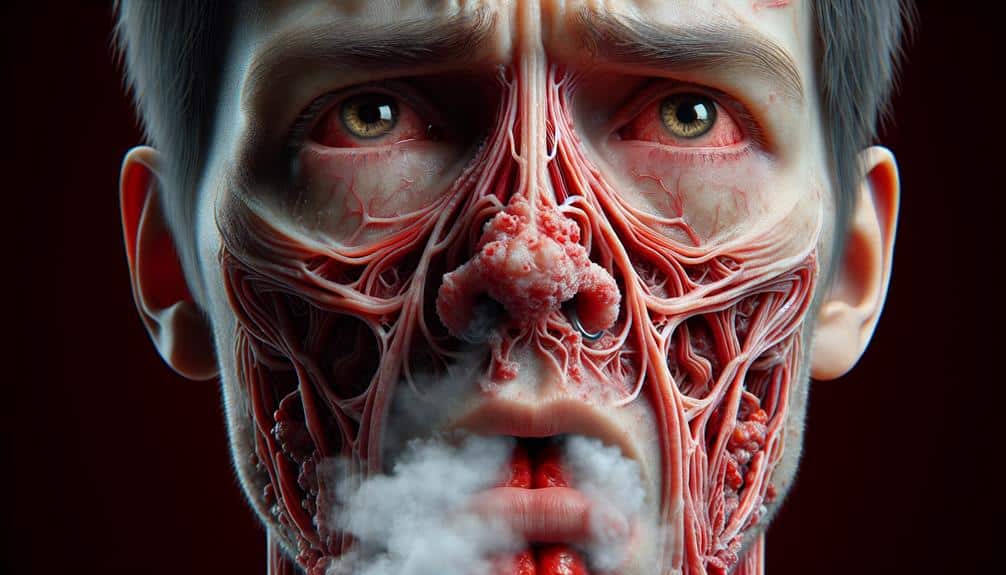
Exposure to pepper spray can cause immediate respiratory distress, making it hard for attackers to breathe and leading to coughing and wheezing. When you deploy pepper spray, the capsaicin within it irritates the respiratory tract. This irritation results in temporary incapacitation, effectively halting the attacker’s momentum. For someone on the receiving end, it’s like having their airways set on fire. The burning sensation in the throat and lungs is particularly severe, often accompanied by chest pain and shortness of breath.
In instances of prolonged exposure, the effects on the respiratory system can become even more pronounced. Attackers may experience exacerbated symptoms, such as intensified chest pain and more persistent shortness of breath. The body’s natural reaction to the irritant is to expel it, leading to sustained coughing and wheezing. While these symptoms can be incredibly distressing, they generally subside after a short period once the individual is removed from the source of exposure.
Understanding the respiratory impact of pepper spray underscores its effectiveness as a self-defense tool. The immediate respiratory distress it causes can provide crucial minutes to escape a dangerous situation, making it a valuable option for personal safety.
Disorientation and Incapacitation
The potent effects of pepper spray can leave attackers disoriented and incapacitated almost instantly. When you deploy pepper spray, the capsaicin binds to the mucous membranes in the eyes, nose, and mouth, causing intense pain and temporary blindness. This disorientation is immediate, rendering attackers unable to focus or coordinate their movements effectively. The severe burning sensation in the eyes and on the skin further contributes to their confusion.
In addition to visual impairment, pepper spray induces respiratory distress. Attackers often experience uncontrollable coughing, choking, and difficulty breathing. These symptoms combine to create a state of incapacitation, making it nearly impossible for the aggressor to continue their attack.
The overwhelming discomfort and inability to see or breathe properly force attackers into a defensive state, giving you crucial time to escape or seek help.
Duration of Effects
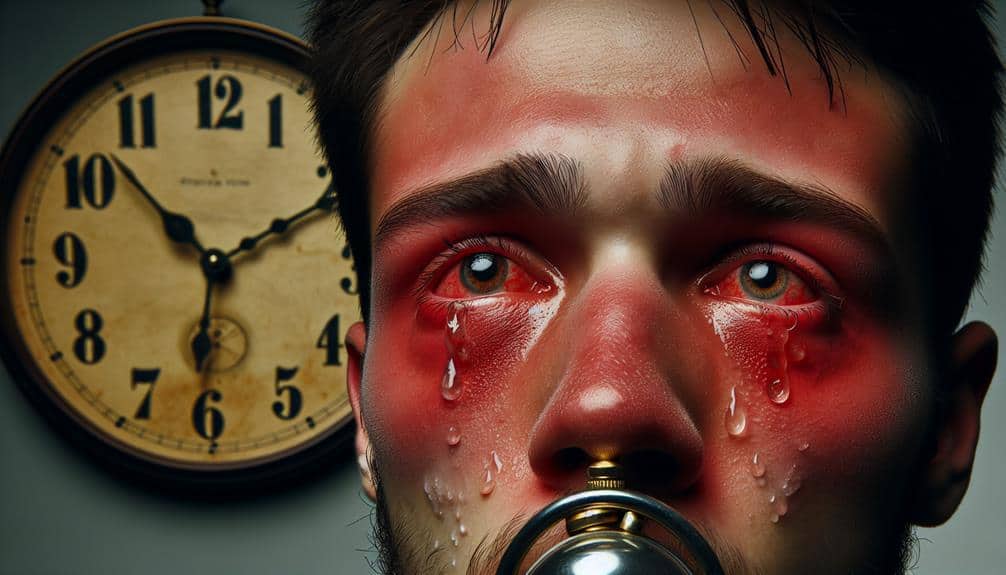
Typically, the effects of pepper spray on an attacker can last between 30 minutes to an hour, providing a crucial window for self-defense or escape. When you deploy pepper spray, the attacker is subjected to intense pain, disorientation, and temporary incapacitation. The duration of effects largely depends on the concentration and type of pepper spray used, but generally, you can expect these debilitating symptoms to persist long enough for you to get to safety.
Pepper spray effects don’t stop at just intense pain. The attacker will likely experience temporary blindness and extreme difficulty breathing. These symptoms create a powerful deterrent, making it nearly impossible for the attacker to focus or continue their assault. Disorientation further compounds their inability to cause harm, as their senses are overwhelmed by the burning sensation.
Understanding the duration of effects is vital for effective self-defense. You need to know that the temporary incapacitation provided by pepper spray can give you that critical time to escape or seek help. While the exact duration can vary, you can rely on the fact that the immediate, intense discomfort will disrupt any attack, offering you a valuable opportunity to protect yourself.
Factors Influencing Severity
When considering the factors influencing the severity of pepper spray effects, several key elements come into play. First, the concentration of the spray is pivotal. Higher concentrations of capsaicin result in more intense effects, causing more pain and irritation.
Next, the duration of exposure matters; prolonged contact amplifies the discomfort and incapacitation.
Your sensitivity to capsaicin, the active component in pepper spray, varies individually. Some attackers might experience severe reactions, while others might endure less.
The distance and accuracy of your deployment significantly influence impact. Spraying from an optimal range ensures maximum effect, while accuracy targets the most vulnerable areas, such as the eyes and respiratory system.
Don’t overlook environmental conditions. Wind direction can blow the spray off course, reducing its efficacy or even causing it to backfire. Temperature and proximity also play roles, with colder temperatures potentially diminishing the spray’s potency.
Proper training is indispensable; it empowers you with the knowledge to use the spray effectively, ensuring that you’re prepared to handle it under stress, thereby maximizing its impact on the attacker.
Mastering these factors equips you with a comprehensive understanding of how to optimize pepper spray for self-defense, ensuring you can incapacitate an attacker efficiently.
Safety Precautions for Use
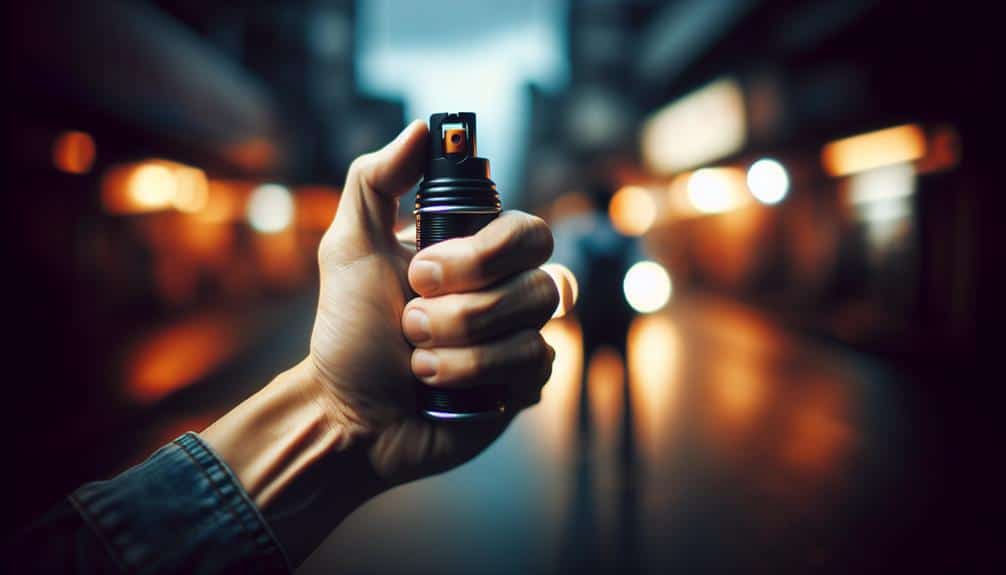
To ensure your safety while using pepper spray, always aim for the attacker’s face at close range to maximize its effectiveness. This ensures the oleoresin capsicum, the active chemical, has the best chance of incapacitating the threat. Proper aim and deployment are crucial, as law enforcement officers often emphasize.
Here are key safety precautions when using pepper spray:
- Aim for the Face and Hair: Targeting these areas ensures the chemical makes contact with the mucous membranes, causing intense burning and temporary blindness.
- Quick Deployment: Keep your pepper spray in a consistent and easily accessible location. This allows you to respond swiftly in emergencies.
- Hyper-Vigilance: Only use pepper spray in dire self-defense situations. Misuse can lead to legal consequences and unintended harm.
- Avoid Congested Areas: Spraying wildly can affect bystanders, causing unnecessary harm. Always be mindful of your surroundings.
After use, rinse any affected areas with cold water immediately to alleviate the burning sensation.
Legal Considerations
Understanding the legal considerations of using pepper spray is crucial to avoid potential criminal charges or civil liability. When you carry pepper spray for personal protection, you must know the laws in your state regarding its possession and use. Some states have specific regulations on the size, strength, and even the circumstances under which you can use pepper spray.
Improper use can land you in serious trouble. It’s essential to ensure that your use of pepper spray aligns with self-defense or protection against imminent harm. If you deploy it without proper justification, you could face criminal charges or civil liability. This could mean hefty fines, legal fees, or even jail time.
To help you navigate these complexities, here’s a quick reference table:
| Legal Aspect | Consideration | Impact |
|---|---|---|
| State Laws | Vary by state regarding possession and use | Compliance is critical |
| Justification | Must align with self-defense or imminent harm | Avoid criminal charges |
| Improper Use | Leads to potential civil and criminal consequences | Fines, legal fees, jail time |
Frequently Asked Questions
Does Pepper Spray Work on Attackers?
Yes, pepper spray works on attackers. It causes immediate, severe pain, temporary blindness, and respiratory distress, effectively incapacitating them. By targeting mucous membranes, it provides you a crucial window to escape and seek help.
Will Pepper Spray Stop an Intruder?
Yes, pepper spray will stop an intruder. It causes intense burning, temporary blindness, and difficulty breathing, incapacitating them for up to 45 minutes. This gives you ample time to escape and seek help.
Is Spraying Someone With Pepper Spray Assault?
Yes, spraying someone with pepper spray can be considered assault if used unlawfully or excessively. You need to understand self-defense laws and ensure you’re using it only in situations with an imminent threat to your safety.
What Happens When You Get Hit With Pepper Spray?
When you get hit with pepper spray, you’ll experience intense burning pain, temporary blindness, and respiratory distress. Your skin will burn, and you’ll feel disoriented, making it hard to breathe, see, or coordinate your movements.


I like this site it’s a master piece! Glad I observed this ohttps://69v.topn google.Raise blog range